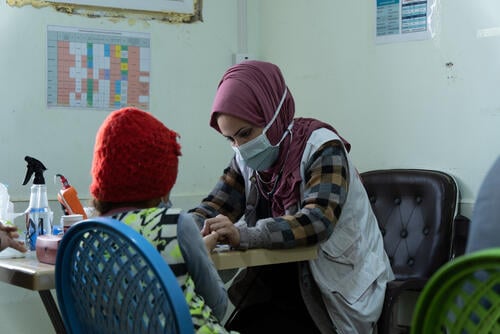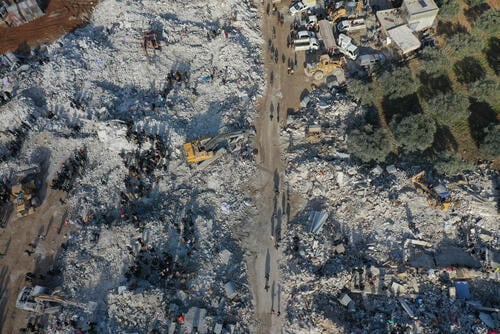It’s mid-morning, and the relentless rain mirrors the sombre conditions that envelop the lives of over 40,000 people who live within the sprawling open-air confinement of Al-Hol camp in northeast Syria. The sea of tents stretches as far as the eye can see, each housing a story of displacement, hardship, and the struggle for survival.
The women, men and children detained at Al-Hol camp grapple with numerous challenges, including limited access to water, inadequate sanitation facilities, and a healthcare system inhibited by restrictive security practices.
The makeshift tents, battered by the relentless rains during winter and burning sunshine during summer, serve as the only barrier between inhabitants and the elements, highlighting the desperate need for improved living conditions and better services.
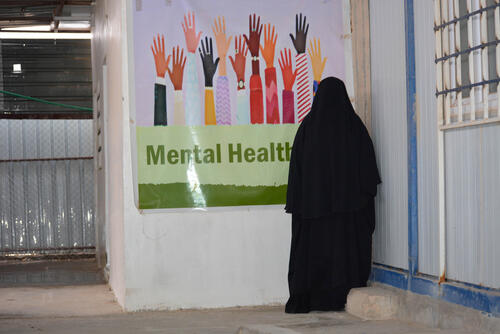
Al-Hol camp is on the southern outskirts of the town of Al-Hol in northeast Syria, close to the Syria-Iraq border. Following the defeat of the Islamic State (IS) group in Syria, the camp is now effectively an outdoor detention centre where people who were displaced during fighting between the Syrian Democratic Forces and IS group, during the battle of Deir ez-Zor in 2018, are detained.
As of October 2023, 93 per cent of people at Al-Hol camp are women and children, with 65 per cent under the age of 18 and 51 per cent under the age of 12.
For those who have experienced traumatic events, such as violence and displacement, the camp has only exacerbated their anguish. The symptoms of post-traumatic stress disorder, depression, and anxiety loom large over the camp, casting a shadow over the mental well-being of its residents.
“During displacement, my family was split due to shelling, my 11-year-old son with his uncles in the village, and me with my five daughters in Hajin town,” says Um Othman*, a mother of six, from Deir ez-Zor in northeast Syria.
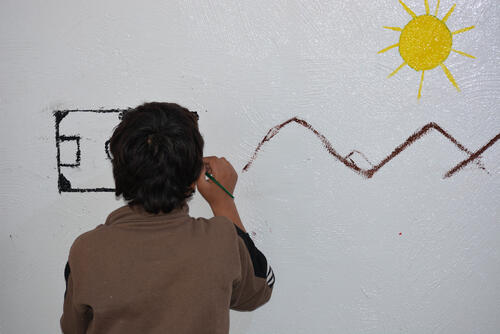
“For six months, I did not know anything about my son and my siblings. We were so poor and helpless. We had to eat grass to survive. No one came to help us or advocate for us,” she says.
For Um Othman, her one glimpse outside the camp did not signify good news. “The first time I left the camp was after three years, when my six-year-old daughter was burned while she was playing with another kid,” she says.
“I was referred to Hassakeh, but it was a stressful experience especially given that there was an armed man escorting us in the ambulance. After 19 days in Hassakeh hospital, my daughter succumbed to her injuries and passed away,” says Um Othman.
Abu Omar*, an Iraqi refugee, was displaced with his family from Anbar province in Iraq in 2015 due the intense shelling between Iraqi forces and the IS group.
“The bombardment was non-stop, day and night. We saw people getting killed before our eyes,” he says. “My kids would come to me seeking safety, but I was helpless as well. We ate leaves and grass at some point out of hunger on our three-day trip to Syria.”
I was embarrassed to tell my neighbours and friends that I am seeking mental healthcare out of fear that they would consider me crazy.Um Khaled, MSF mental health patient
“The circumstances around our displacement were harsh and it negatively affected my mental health. We left our houses and everything behind,” says Abu Omar.
Since then, he’s suffered from sleep disturbances and anxiety, making a small living for his family by selling food from a cart. Most days he roams through the camp selling items and making around 10k SP (70 cents) per day.
Children, innocent victims of circumstances beyond their control, face not only physical hardships but also the visible and invisible scars of mental distress. For Médecins Sans Frontières (MSF) staff working at the camp, the needs are clear.
“The mental health waiting area at the clinic is crowded. On average, we have 25 patients coming for individual counselling sessions every day, and around 40 patients for other mental health activities,” says Sama, MSF’s mental health activities manager at Al-Hol camp.
In our pursuit to address the mental health crisis at Al-Hol, it has been imperative to destigmatise mental health and psychosocial care. Encouraging open conversations about mental health is a crucial step in fostering a supportive community where seeking help is seen as a sign of strength, not weakness.
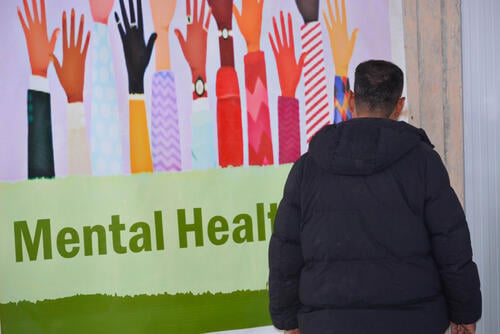
“In our society when someone is depressed, they say that his spirit is possessed and that he needs exorcism, but I decided to go the scientific way and visit MSF’s clinic,” says Um Khaled*, an MSF patient.
“I was embarrassed to tell my neighbours and friends that I am seeking mental healthcare out of fear that they would consider me crazy. I really get benefits from these sessions because I now know life isn’t only about taking care of others, it is taking care of yourself, too,” she says.
Mental health activities are a crucial part of any medical response. They can provide a safe and supportive environment for people to express their feelings, process their experiences, and learn coping mechanisms.
These activities can include individual counselling for mild to severe mental health conditions (including identification and referral of psychiatric cases), psychosocial group sessions including psycho-education, and recreational activities.
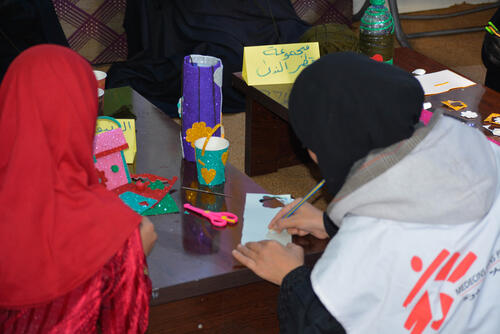
“Our patients now advocate for mental health services. According to statistics from last year, 70 per cent of new patients are referred by relatives, friends and the community,” says Sama.
Walking along the muddy paths of Al-Hol camp after a downpour of rain, it becomes evident that the challenges faced by its residents extend far beyond the physical constraints of their environment.
“The Iraqi Government will repatriate me next week. I have mixed feelings. I am happy and unhappy at the same time,” says Um Ibrahim*, an MSF patient.
“I will leave some relatives and siblings behind, including my sister. That’s made my happiness incomplete,” she says.
*All names have been changed to respect the anonymity of our patients at their request
Since September 2021, MSF has been providing mental health and psychosocial support services inside Al-Hol camp. In 2023, we supported more than 10,000 people with psychosocial group activities for children, teenagers, and adults, and provided 2,000 individual therapeutic counseling sessions.
In 2022, MSF released a report based on our work in Al-Hol camp: 'Between Two Fires: Danger and Desperation in Syria's Al Hol Camp'.





